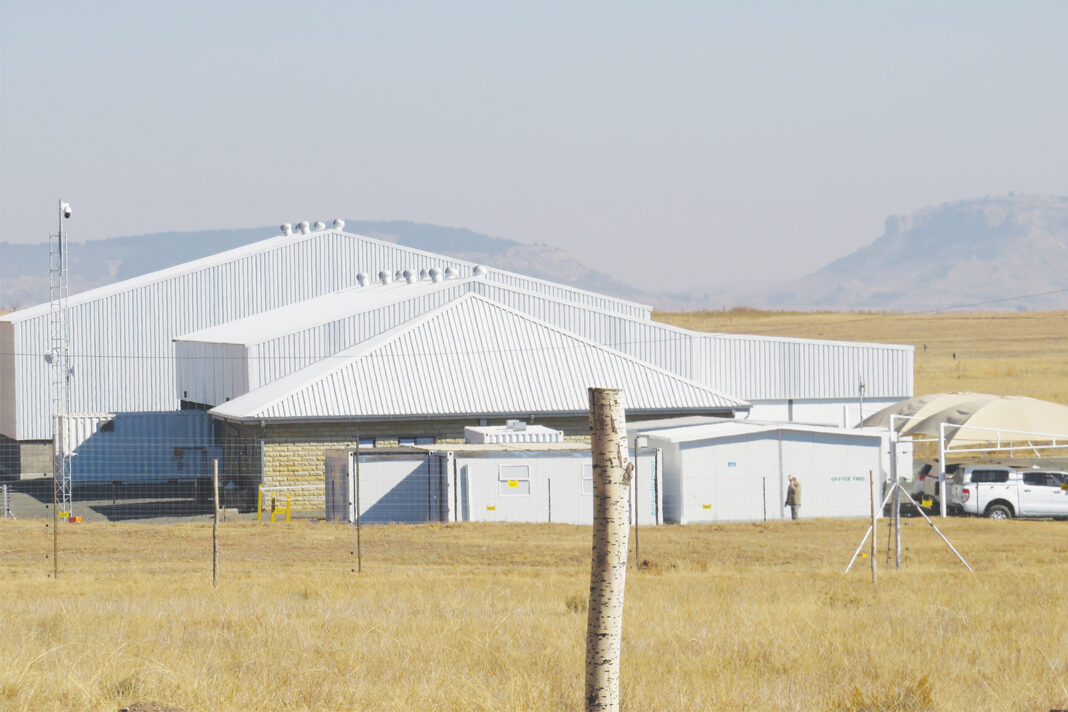By Kefiloe Kajane
The community of Ha Letsoela in Berea is up in arms, with field owners demanding that Highlands Pure, a cannabis company operating in the area, to increase the fields rental fees from M200 monthly to M5 000 per hectare of land.
The people in this village are in a 60-year contract with Highlands Pure to allow the company to grow cannabis, and the contract set to be reviewed in every 10 years.
During this week’s visit to the village by theReporter, a community representative who is also one of the lessors who have who have let their land to the cannabis firm, Sajene Letsoela, explained that the villagers entered into the contract with the company in 2019. He said it was agreed that each hectare would fetch a meager M200 per month on a rented field.
He said they did not understand what the contract entailed when they signed it, regretting that the agreement was written in English. It was only later when they learned that the Sesotho version of the document stipulated that they would only be paid a M200 fee contrary to their expectations.
He explained that their biggest query at the moment is that they want the rent money to increase from M200 to M5 0000 hectare per month.
He claimed that their bid to meet with the firm’s owner to iron out any differences hit the wall as he never showed up. But, he added, the dwellers have sworn to continue with their claims “even if it meant one of them could perish.”
“We have been everywhere to try to find someone to intervene on this matter because we want what we deserve. We want our children to benefit from our fields in the future. We are serious that we want the firm to increase the monthly fee. We do not care as to who is employed at the firm,” he claimed.
“What also frustrates us is that they have not fulfilled half the promises that they made when they arrived here. We were told that the firm would facilitate the supply of power and water but none of these have been fulfilled. We live in darkness and are thirsty.
“We believe that if the matter was not handled by councilors and chiefs we would not be at this stage today. We should have been directly involved from the beginning ourselves. We strongly suspect that the mess has been caused by the chiefs,” Letsoela argued.
In his response, Moifo Letsoela village chief of Ha Letsoela threw out allegations that the residents did not understand the contract and that chiefs were blame. He said before contracts were penned down, the firm hosted nine meetings with the residents before the contracts were finally issued.
He said many of their fields had years gone without being tilled though they claimed to be dependent on field crops after harvest. He specified that at first, the firm wanted to buy the fields but the residents refused and opted for renting out their properties for the plantation. He said the contracts were written in both languages of Sesotho and English, observing that at the time of meeting the public, the Sesotho version of the agreements was also read.
They were given a month and two weeks to go through the contracts. This was to ascertain that everyone understood the negotiations so as to express any dissatisfaction. No one ever came forward to voice any discontent. During the councilors’ meeting with them (public) some complained that any attempts to derail the project was a taking food out of their mouths.
“May be someone has advised them otherwise that is why they now want an increase to the fees paid. They were allowed a plenty of time to scrutinize the agreements. There are still some field owners who did not offer their land for plantation as they did not accept the amount of money to be paid,” he explained clearly.
Letsoela confirmed the contract is a 60-year agreement which can be reviewed in every 10 years. He said the first three years of agreement were for conducting studies on the project with a plan to review it on the fourth year of implementation.
He said the agreement provided for preference of employment to field owners.
He said several villagers are benefitting from the project as they have been offered employ for income generation in order to fend for their families.
“People now have money and we have seen many shops resuming business since the dawn of the project. It has brought hope to the youth as they realise that the project will bring economic change in their lives,” he remarked.
“I hope that they can just wait for the time the contract will be reviewed, so that they can negotiate and resolve any disputes. They should desist from complaining to irrelevant persons and approach the firm’s management and shareholders,” Letsoela advised matter-of-factly.
This paper visited Highlands Pure Lesotho premises at Ha Letsoela to hear the side of the story of the director Teboho Mofo but was referred to the company’s coordinator ‘Mamahali Peete.
The company specializes in growing of non-perennial crops, growing of spice, aromatic as well as drug pharmaceutical crops.
The Highlands Pure Lesotho coordinator Peete said her office has not received any complaints from the residents, saying the claims were just rumours.
She vehemently denied any receipt of complaints had been levelled against her office by the dissatisfied residents.
“These are the people we work with and they know the proper channels that have been introduced to them to follow when complaints arise. They seem to be engaging in fight instead of holding talks to fix any conflicts,” Peete said.
Transformation Resource Centre’s local governance and community empowerment officer Tṧitso Kapa said Lesotho has a huge “gap of as it does not have compensation policy.” He said Lesotho does not have a clear frame work that explains how much can a person earn from a square metre land use.
“Compensation rates are very low on communal and individual ownership. It is hard to determine how much the field owners should earn. It has not been ascertained as to how much in real should be owners benefit,” Kapa said.
“Many times people violate agreements because there is no exact policy to guide these issues. Also, investors sometimes to take advantage because of the absence of such policy. They normally say they are legally obligated to compensate people but when it comes to corporate social responsibility, they say they do not have any legal obligation that tie them to do it. This is because the law only tells them to give a certain percentage of their profits. It is easy for such investors to claim they are not making an profits,” he said.









